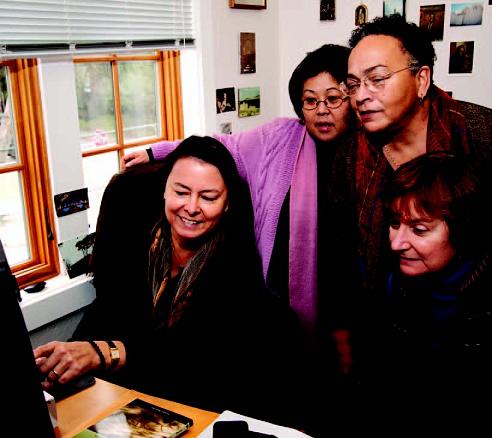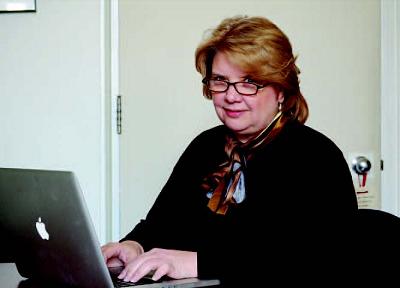
“Social media is changing our culture in profound and dynamic ways.”
— ELIZABETH DRESCHER, Ph.D. ’08
assistant professor of Christian Spiritualities
and director of the Center for Anglican Learning & Leadership
at the Church Divinity School of the Pacific (CDSP)
In a class on spiritual memoir two years ago, Franciscan School of Theology Associate Professor Darleen Pryds assigned her students the task of creating their own Facebook page.
“It turned out to be a great way for me to connect with the students, and for us all to connect with each other,” says Pryds, who teaches Christian Spirituality and History. “On Facebook, I shared when and where I was preaching, we all exchanged articles and ideas, we learned what was going on in churches, and we also learned new things about each others’ interests — one of my students, for example, plays the trumpet — that may not have come out in the classroom.”
 |
|
Darleen Pryds with Franciscan School of Theology faculty and staff |
That class convinced Pryds that Facebook is an enormously important tool that can be used professionally and in teaching, not just personally. “I was stuck once, getting a sermon written on Abraham and Isaac,” she recalls. “I asked for help from colleagues and friends on Facebook and got lots of wonderful ideas. Facebook broadens your communities and allows for a communitarian approach to teaching,” she says. “It’s all about interaction. With Facebook, we can communicate with an international community of students and scholars, as well as friends and family.”
To those who say they don’t have time for Facebook or criticize it as trivial or a waste of time, Pryds points out that Facebook can be viewed as a different way to spend time with people. “You might view Facebook as a digital version of shooting the breeze around the company water cooler. Sometimes those watercooler conversations lead to innovations and important insights…the same is true with Facebook.”
Elizabeth Drescher (Ph.D. ’08), assistant professor of Christian Spiritualities and director of the Center for Anglican Learning & Leadership at the Church Divinity School of the Pacific (CDSP), is charged with engaging CDSP’s 750 students in online classes. “I learned quickly,” she says, “that my job required more than a computer-based understanding of online learning. In the past, online learning was about automating face-to-face learning. But social media is changing our culture in profound and dynamic ways because it involves high levels of collaboration and broad distribution over geography and time.”
— Darleen Pryds
Drescher adds that we now have a different understanding of who “owns” knowledge. Rather than locating knowledge or leadership in a specific person, social media finds them in a place — a Facebook page, for example — where people can come together to create their own understanding, and learn to understand others. “Learners have much more control over their environment. For example, we can be with people all over the world at any time,” Drescher says, “and this is changing consciousness. We are beginning to think very differently about community, relationships, and knowledge itself, because social media challenges our traditional understandings of fixed relationships and bodies of knowledge.”
Social media also is changing the way seminaries market to prospective students and other interested parties. CDSP reaches many prospective students and other audiences through Facebook ads. For $52, more than 400,000 people viewed CDSP’s Facebook ad for its annual Epiphany West conference in January.
 |
|
Elizabeth Drescher |
Drescher recently gave a presentation in Tucson, Phoenix, Seattle, and Anaheim called Tweet if You Love Jesus, on what social media means for religious leadership and community building. “I wrote my dissertation on late medieval spiritualities in England, looking at how ordinary believers appropriated resources of the church when they got access to learning. The more believers were able to access what had once been privileged knowledge, the more they adapted it to their own lives, and, ultimately, that changed the church. When I started looking at social media, I could see that it is central to the creation of new understandings of church and of seminary education. There are some alarmist responses to social media, questions about how it may affect face-to-face relationships, and spiritual formation. There is always anxiety about change. For me, it’s comforting to understand these changes in the context of a longer historical horizon. I think, ‘We’ve been through this before; we know how to do it.’ We might call it the ‘Digital Reformation.’”
GTU Alumna Noreen Herzfeld (Ph.D. ’00) says social media is returning us to a time when religion was more oral-based. “In social media, someone creates something, then someone changes it, and this can go on without end,” says this professor of both theology and computer science at St. John’s University in Minnesota. “The positive side of that is the creativity it engenders. But it also takes away the control that religions have over text.
“As Americans, we’re fairly uncritical consumers of technology because we have an inherent belief in progress. I think all technologies are a mixed blessing. When we adopt a new technology, we give something up, and we gain something new. It’s important to be aware of the gains and the losses.” Herzfeld’s book, Technology and Religion: Remaining Human in a Co-created World, published in May 2009, raises key theological and ethical questions about groundbreaking technologies, including social media.
For better or worse, gain or loss, it appears that social media, or the “digital reformation,” will be with us for a while. See New York Times reporter David Carr’s enlightening article: Why Twitter will Endure.
